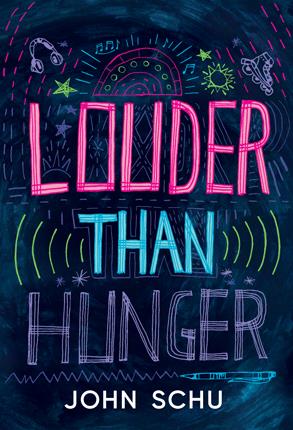| Louder than hunger Author: Schu, John | ||
| Price: $23.78 | ||
Summary:
Jake volunteers at a nursing home because he likes helping people. He likes skating and singing, playing Bingo and Name That Tune, and reading mysteries and comics aloud to his teachers. He also likes avoiding people his own age . . . and the cruelty of mirrors . . . and food. How long can Jake punish himself before he truly disappears?![]() Download a Teacher's Guide
Download a Teacher's Guide
| Accelerated Reader Information: Interest Level: MG Reading Level: 3.60 Points: 3.0 Quiz: 550941 |
Reviews:
Kirkus Reviews (01/01/24)
School Library Journal (+) (02/01/24)
Booklist (01/01/24)
The Bulletin of the Center for Children's Books (00/12/23)
Full Text Reviews:
School Library Journal - 02/01/2024 Gr 5 Up—Eighth grader Jake is bullied at school. He has only two friends. One is his grandmother, who understands him in a way his parents do not and shares his love of musicals. The other is an angel statue he named Frieden. It is only with her who Jake can be honest about how desperately in need of help he is. Jake is wasting away, controlled by "the voice," which dictates what and how much Jake can eat—and it is louder than his hunger. A former teacher at the nursing home where he volunteers calls Jake's mother to share her concerns about his weight, ultimately resulting in placement at an inpatient treatment center called Whispering Pines. A regimented schedule including group therapy, art therapy, and work with a psychologist provide Jake with multiple ways to combat his anorexia. Jake is furious that all treatment is at odds with the voice and refuses to participate. It is heartrending and frustrating to watch Jake take steps forward, and then regress multiple times in his nearly yearlong stay, but this repetition sheds insight into the reality of treatment. It is not until Jake begins to genuinely participate that readers learn Jake's backstory, and the relationship between bullying and his disordered eating. The novel's mid-1990s cultural references may be unfamiliar to young readers, but the multitude of issues Jake is struggling with are evergreen. The novel is written in verse from Jake's perspective, allowing poignant access to his thoughts and feelings. Schu draws on his own experience with anorexia, adding authenticity to the voice. The author clearly cares about his young readers, checking in with them at the end of the book and providing resources about eating disorders. Jake reads as white, as do others in his program. VERDICT Jake's struggle with anorexia isn't easy to read but his ultimate steps toward health provide hope, as does this much-needed and underrepresented male perspective on eating disorders.—Juliet Morefield - Copyright 2024 Publishers Weekly, Library Journal and/or School Library Journal used with permission.



